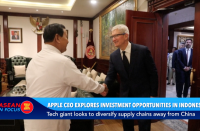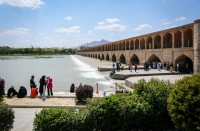
CANBERRA, Australia (Reuters) — Asian TPP nations announced on Tuesday (January 24) they were looking for ways to save the multi-country trade pact in the wake of U.S. President Donald Trump’s decision to pull his country out of it.
Fulfilling a campaign pledge Trump signed an executive order in the Oval Office on Monday (January 23) pulling the United States out of the 2015 TPP agreement and distancing the United States from its Asian allies.
Australian Prime Minister Malcolm Turnbull said he is looking to salvage the Trans-Pacific Partnership by encouraging other nations into the agreement.
Trump’s decision opens the door for the remaining members of the pact, who are more reliant on trade, to bring other nations, in particular China, into the negotiations.
“We want to have more opportunities with more markets. We already have a China-Australia Free Trade Agreement. Certainly there is the potential for China to join the TPP,” Turnbull told reporters in Canberra.
Turnbull said he had discussions with Japanese Prime Minister Shinzo Abe, New Zealand Prime Minister Bill English and Singaporean Prime Minister Lee Hsien Loong overnight about the possibility of proceeding with the TPP without the United States.
“It is possible that U.S. policy could change over time on this, as it has done on other trade deals. There is also the opportunity for the TPP to proceed without the United States and I’ve had active discussions with other leaders as recently as last night, with Prime Minister Abe about that,” he added.
Japanese Prime Minister Shinzo Abe on the other hand said Japan would continue to seek the United States’ understanding of the strategic benefits of joining the TPP.
“We believe that President Trump is aware of the importance of a free and fair trade. We will continue to calmly seek his understanding for TPP’s strategic meaning,” he said at a meeting in parliament.
Arrangements are being made for Abe to visit the United States to meet Trump, but it is undecided who would accompany the premier.
Obama framed TPP without China in an effort to write Asia’s trade rules before Beijing could, establishing U.S. economic leadership in the region as part of his “pivot to Asia.”
China has proposed a counter pact, the Free Trade Area of the Asia Pacific (FTAAP) and has championed the Southeast Asian-backed Regional Comprehensive Economic Partnership (RCEP).
The dollar was under pressure in Asia with Trump’s focus on trade protectionism, fuelling suspicions his administration might seek a competitive advantage through a weaker currency.
The talk of trade wars favored safe-haven Treasuries and the Japanese yen while leaving equities mixed.
MSCI’s broadest index of Asia-Pacific shares outside Japan edged up 0.1 percent but Tokyo’s Nikkei slipped 0.3 percent.
The remaining 11 TPP nations are Brunei, Canada, Chile, Japan, Malaysia, Mexico, Peru, Singapore, Vietnam, Australia and New Zealand.







